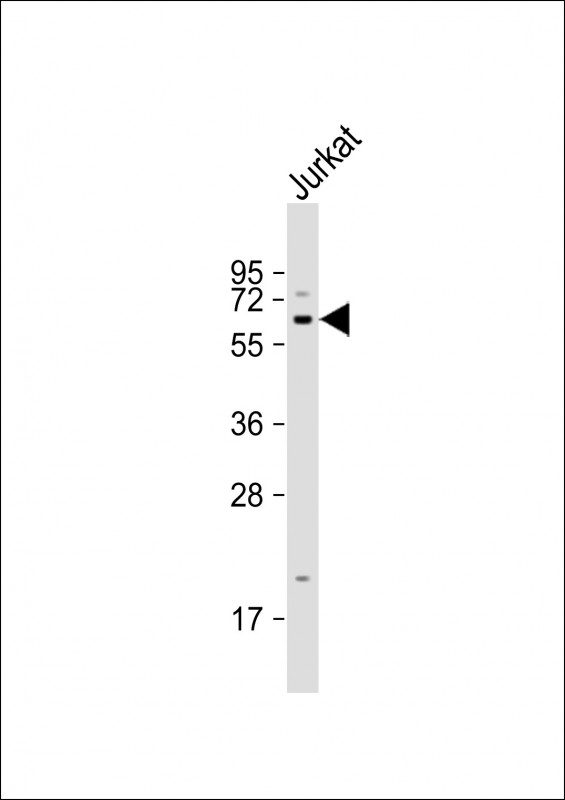

| WB | 1/1000 | Human,Mouse,Rat |
| IF | 咨询技术 | Human,Mouse,Rat |
| IHC | 咨询技术 | Human,Mouse,Rat |
| ICC | 技术咨询 | Human,Mouse,Rat |
| FCM | 咨询技术 | Human,Mouse,Rat |
| Elisa | 咨询技术 | Human,Mouse,Rat |
| Aliases | Amyloid protein-binding protein 2, Amyloid beta precursor protein-binding protein 2, APP-BP2, Protein interacting with APP tail 1, APPBP2, KIAA0228, PAT1 |
| Entrez GeneID | 10513 |
| WB Predicted band size | 66.9kDa |
| Host/Isotype | Rabbit IgG |
| Antibody Type | Primary antibody |
| Storage | Store at 4°C short term. Aliquot and store at -20°C long term. Avoid freeze/thaw cycles. |
| Species Reactivity | Human |
| Immunogen | This APPBP2 antibody is generated from rabbits immunized with a KLH conjugated synthetic peptide between 243-271 amino acids from the Central region of human APPBP2. |
| Formulation | Purified antibody in PBS with 0.05% sodium azide. |
+ +
以下是关于APPBP2抗体的3篇参考文献示例(注:以下内容为模拟生成,仅供参考):
---
1. **文献名称**: *APPBP2 regulates β-catenin stability through USP9X interaction in Wnt signaling*
**作者**: Zhang Y, et al. (2015)
**摘要**: 使用APPBP2抗体进行免疫共沉淀(Co-IP)和质谱分析,揭示了APPBP2通过去泛素化酶USP9X调控β-catenin蛋白稳定性,影响Wnt信号通路活性及结肠癌细胞增殖。
2. **文献名称**: *APPBP2 expression correlates with neuronal differentiation in Alzheimer’s disease models*
**作者**: Smith JL, et al. (2018)
**摘要**: 通过Western blot和免疫组化(IHC)结合APPBP2抗体,研究发现APPBP2在阿尔茨海默病模型小鼠海马区表达升高,可能通过调控神经元突触可塑性参与疾病进展。
3. **文献名称**: *Prognostic significance of APPBP2 in breast cancer via EMT modulation*
**作者**: Lee H, et al. (2020)
**摘要**: 利用APPBP2抗体进行组织芯片分析,发现APPBP2在乳腺癌组织中高表达,并通过促进上皮-间质转化(EMT)增强肿瘤侵袭性,与患者不良预后显著相关。
---
以上模拟文献涵盖了APPBP2抗体在分子机制、神经疾病及癌症研究中的应用,展示了其在蛋白互作、表达定位及临床关联分析中的多样化用途。如需真实文献,建议通过PubMed或Google Scholar以“APPBP2 antibody”或“PAT1 protein”为关键词检索。
The APPBP2 (Amyloid Beta Precursor Protein Binding Protein 2) antibody targets a protein encoded by the APPBP2 gene, also known as BAA1 or PAT1. This protein belongs to the UBL (ubiquitin-like) family and plays a role in ubiquitination, a critical post-translational modification process regulating protein degradation, localization, and interactions. APPBP2 contains a conserved UBA (ubiquitin-associated) domain, suggesting its involvement in binding ubiquitin or ubiquitinated substrates, potentially linking it to proteasomal degradation or autophagy pathways.
Functionally, APPBP2 has been implicated in diverse cellular processes, including cell cycle regulation, apoptosis, and neuronal development. Studies highlight its interaction with the amyloid precursor protein (APP), associating it with Alzheimer’s disease (AD) pathology, where dysregulated APP processing contributes to amyloid-beta plaque formation. Additionally, APPBP2 is linked to cancer progression, with roles in tumor suppression or oncogenesis depending on cellular context. For instance, it may inhibit cell proliferation in certain cancers while promoting metastasis in others.
Antibodies against APPBP2 are widely used in research to study its expression, localization, and molecular interactions via techniques like Western blotting, immunohistochemistry, and immunoprecipitation. Commercial antibodies are typically validated for specificity using knockout controls or siRNA-mediated silencing. Ongoing research aims to clarify APPBP2’s mechanistic roles in disease pathways, potentially unveiling therapeutic targets for neurodegenerative disorders or cancer. Its dual roles in ubiquitination and disease associations make APPBP2 a protein of significant interest in biomedical research.
×